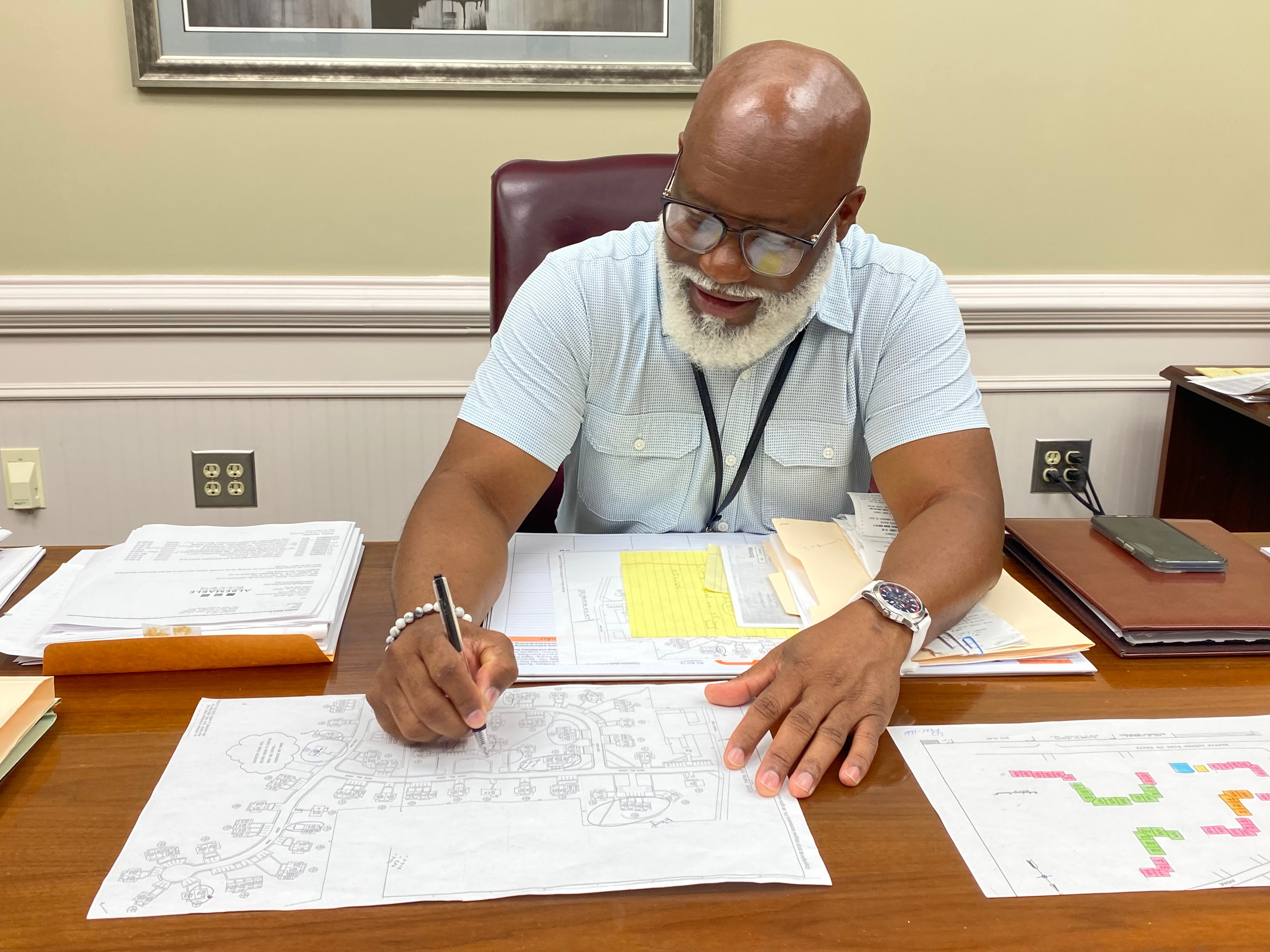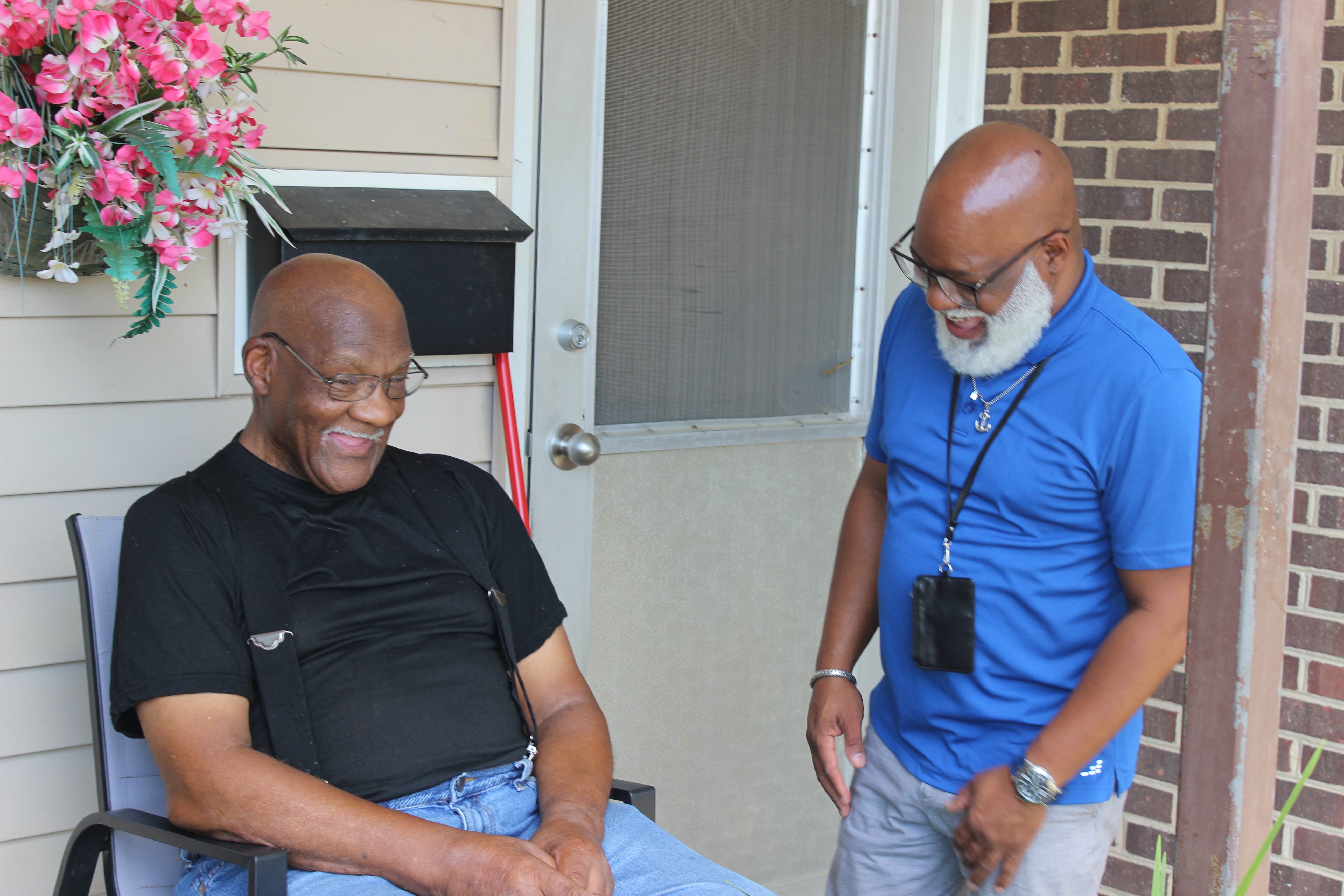STANLY MAGAZINE: Albemarle’s housing director talks about leading his ‘city within a city’
Whenever there’s a problem within the City of Albemarle’s public housing community, whether it is overgrown vegetation along the sides of buildings, fences that need to be repaired or a chronic sewage problem impacting numerous families, Dr. Kim Scott wants to know about it so he can go about trying to fix it.
As the so-called mayor of Albemarle’s public housing community, or a “city within a city,” as he calls it, Scott, who’s been the city’s public housing director since January, is not one to sit idly by when there are problems to be tackled.
“I want it fixed because if it represents a safety and a health issue, I cannot sit at my desk and ignore it,” he said. “That’s just not who I am.”
As someone who has always been naturally inquisitive, Scott, 56, said he always wants to figure out how “the machine works.”
“I want to know every aspect of the machine,” he said, “from the oil to the gas to the pistons — everything.”

Kim Scott has been busy working to improve public housing since he was named director in January.
From a career in education to public housing
Originally from Albemarle, Scott grew up about four blocks from Amhurst Gardens and vividly remembers playing with friends who lived in the public housing community.
“This was like home to me because I had relatives here, I had friends here, so anytime it was time to play, this is where I came to play,” he said.
After college, where Scott majored in elementary education, he came back to Albemarle and spent about four years working in public housing as the resident coordinator.
Wanting to experience what public housing was like on a larger scale, Scott moved to Charlotte, where he served as HOPE VI resident services coordinator. He was responsible for developing family self-sufficiency programs and facilities management in the First Ward, Dalton Village and Fair View Homes housing communities.
“My plan was to eventually always come back home, but I wanted to get that experience,” he said.
Scott then changed careers and for much of the next two decades spent time as a teacher and school administrator. He spent about 10 years at an elementary school in Scotland County, where he worked with low-income Lumbee Indian students, before coming back home, where he served as principal at both Albemarle Middle School and Albemarle High School. He later served in other roles at charter and for-profit schools.
As an educator, he regularly worked with at-risk children, many of whom lived in public housing, which gave him a unique perspective that helped inform how he views his current role.
“You have those social ills that come along with poverty and students being behind academically, so even as a teacher, I felt it was important to get agencies involved in the school, even in my classroom, to come meet the needs of the students as well as their parents,” he said.
Some of the most enduring memories as an educator occurred during his time in Scotland County, one of the poorer parts of the state, when he said parents eagerly invited him to their house — just to show him they had running water.
“I’m standing there thinking: I’m accustomed to seeing faucets and spigots and they would literally come into the kitchen and turn the water on like, ‘Look,’ ” he recalled. “It was that poor and I couldn’t believe it. I was shocked at the time because I’m thinking this is America.”
His teaching experience helped instill in him that even within the same community, people can often operate on very different levels.
“It humbles me to understand that you can’t look at people and expect everyone to be the on the same level,” he said, noting there are so many “nuances” that can cause people to struggle.
It also taught him that he has to meet people at the point of their needs and help empower them to want to create a better life for themselves.
Scott moved back to Albemarle from Florida at the end of 2021 to be closer to his six siblings. He planned to continue his career in education but as luck would have it, he received a call from Garry Lewis, Albemarle’s interim director of public housing, asking him to consider applying for the full-time position. He was appointed the new housing director and assumed his role in mid-January.
“As fate would have it, I believe I was assigned at this point in my life to be here,” he said.
Tackling the sewage problem
As the so-called mayor of his new community — which consists of 200 apartment units, including multi-family sites at Amhurst Gardens, along South Bell Avenue near N.C. Highway 24-27 Bypass, and one-bedroom units for elderly and disabled individuals at Elizabeth Heights, near downtown — Scott quickly went about touring the facilities and meeting with the many residents.
He discovered several familiar faces dating back to his time as a child including John and JoAnne Branch, who have been Amhurst Gardens residents since public housing first began in the early 1970s. Scott was best friends with their son, Elbert, who was a former police officer with the city.
“They’ve been here and when I returned here, I knew exactly where they lived and I went to see them first,” he said.
John Branch, 77, is optimistic Scott will make a lasting impact in the community.
“It’s great to see him come back because he will make a difference in here,” Branch said, noting he’s already seen several improvements.

Longtime Amhurst Gardens resident John Branch talks with Kim Scott.
In his short time with the city, Scott, who regularly meets with residents, has worked to alleviate some of the long-standing issues. Wanting to reduce cars speeding along South Bell Avenue, Scott has developed connections with Police Chief Jason Bollhorst and the Albemarle Police Department as well as officials from the Sheriff’s Office, who come through the community a few times a week.
The public housing department’s work over the past several months to improve the community seems to have made a notable impact, according to a recent federal HUD inspection, undertaken over the course of three days in mid-June. The department received a score of 75 out of 100, “the highest it’s been in 10 years,” Scott said.
“Dr. Scott is someone who is truly dedicated to service,” said City Manager Michael Ferris. “That dedication stood out during his work with the Department of Public Housing when I first met him nearly 30 years ago. Dr. Scott genuinely cares about improving the lives of the people that the Department of Public Housing serves.”
The biggest obstacle in front of Scott is tackling the ongoing sewage problems caused by several collapsed pipes underneath many of the units — an issue that had persisted for many years and has become a health hazard for many residents. Scott first learned about it in mid-January.
Scott and his staff are working with Stogner Architecture in Rockingham to determine the severity of the problem and hire contractors to renovate the properties. Albemarle City Council approved a two-year contract with Stogner at it’s July 11 meeting. Since 1991, Stogner has worked on 18 public housing projects within the city, according to its website.
At least 22 units on South Bell Avenue along with Inger and Grigg streets were identified as having plumbing problems. The total represents approximately 25 to 30 families, or about 15 percent of the 150 units in Amhurst Gardens, Scott said.
“It was just disturbing to me that this was something that had lasted for several years and no one had addressed it,” he said.
The families living in the impacted properties will be temporarily relocated to various vacant units. While things can change, depending on the severity of existing problems or additional damage discovered, Scott said he hopes to have the units fully renovated in three to six months.
Empowering his residents
During his tenure, Scott has been working to help provide wrap-around services for many families, including healthcare, mental health services, youth development, childcare and literacy programs.
He encourages residents that just because they live in public housing, that does not mean they cannot be successful and can’t work towards finding a stable job or purchasing their own home. Despite the obstacles they’ve encountered or might still be dealing with, Scott wants to instill in them that they too can have “a piece of the American Dream.”
Part of his advocacy role he likens to that of a cheerleader working to inspire the home crowd.
“It’s just like going to a football game and the team that you love is losing, ” he said. “But there’s always the wonderful cheerleaders on the sideline that will help you remember you are really here because you love this team.
“As the mayor of this city,” he said, extending the metaphor, “it is my job to celebrate the residents, to provide them with these agencies in our county that can help them get on their feet and to change their minds, about whatever trauma has happened to them or whatever their perception is of the world outside of Amhurst.”
Carole Cole, 63, who has lived in Amhurst Gardens since the 1990s, appreciates Scott’s dedication to his residents, noting that during his first six months on the job, she gives him an A+.
“Since he has been here with us in the Amhurst area, there has not been a day that I called him that I could not reach him,” she said. “If there was something I needed done in the house, he would make sure it was done.”
As someone who knew Scott when he was growing up, she is proud of the man he’s become — and all the work he’s been doing to help people like herself.
“I don’t know what a male angel is called,” Cole said, “but he is an authentic angel.”

